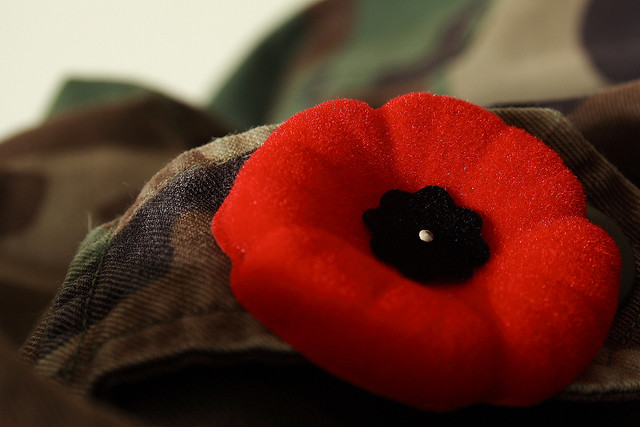By Dessa Bayrock (The Cascade) – Email
Print Edition: November 13, 2013

Remembrance Day may be the last pure holiday; no one talks about it before it arrives, and no one talks about it after it leaves. For a single day every year, we uneasily sit and think about the past.
As a holiday, it treads a delicate line between bitterness and patriotism. An entire nation stands in silence and prays war never happens again. Parents teach their children to remember and respect, as though children can understand the darker issues beneath the practiced phrases.
When I was growing up—six, seven, eight years old—I used to dread it: the silence, the gun salutes, the weeping, the television specials, all of it. The poems, often the same ones, read out by old men with voices like creaking barrels steeped in brandy, the crackly audio playing over grainy black-and-white images of buildings and soldiers and broad fields, all equally and totally destroyed.
As a child I couldn’t really comprehend it, its scale, its breadth and depth, the sheer amount of spilled blood and severed limbs, the size of the monuments or what they represent. As an adult, I still can’t fully understand it, and I’m sure I’m not the only one. But I spend one minute out of every year trying to.
One minute is not a long time, but it’s about as long as I can struggle with those questions: the concept of war and how that affects the past, present, and future.
For maybe the first time this year, I appreciate the subtle difference between Remembrance Day here and Veteran’s Day in the States. Veteran’s Day focuses on the narrow demographic that serves or has served in the armed forces. Acknowledging and respecting the work soldiers do is a key part of a day of remembrance, but is by no means the only part. To put the full emphasis on soldiers reinforces the perception of army life as just another job, be it during WWII or in 2013. Wartime is not, and should never be, a job – no matter how enticing recruitment posters would have you think otherwise.
Our emphasis is on the act of remembering, not just soldiers but how war affects all people in a nation, be it those who fought for their lives or those left behind home to imagine how mud mixes with blood. Our day is marked not only by respecting those who fought, forcing us to face the ideas that put them in the fight at all, sometimes a fight they were forced into. Remembering is not only about paying respect, but contemplating all pieces of both war and humanity.
Where Veteran’s Day is about the glory, Remembrance Day is about the blood. War isn’t easy to look in the face, nor should it be.
This is side of war I find most troubling – the propaganda, portraying the utter pluckiness of those left behind at home, the sheer determination portrayed in vintage factory footage pulled from one newsreel or another. What a marvel of the modern age that women can work in factories, every narrator seems to say. What a testament to human spirit that we can keep trucking along at home while an entire generation is dying overseas. This national reaction is something we’re ultimately proud of, the jaunty 40s-era piano soundtrack playing as women with curled hair tucked beneath workmen’s hats throw red-hot rivets to one another with casual dexterity. Their actions and expressions are cheerful, almost cheeky.
These film clips terrify me, even more than the footage of destroyed architecture or the grainy shots of field hospitals. The tone is one of economic prosperity, of teamwork, of triumphant carrying-on. There may be both light and dark to any matter, but war is not something in which we can see the silver lining. The whitewashed side of war all too easily encourages the idea of the army as a career like any other while a grim subtext of glory and patriotism stands behind every ceremony; we’ve gone to war before, and we’ll do it again.
I prefer to keep Remembrance Day resiliently and purposefully uncomfortable – a time set aside to consider what Wilfred Owen called “the old lie”: Dulce et decorum est pro patria mori.


